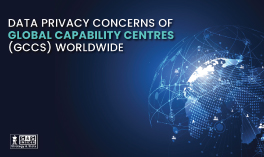
Global Capability Centres (GCC) have become important for global corporations to innovate and cradle operational execution. However, these centers are dealing with large volumes of sensitive data across geographies and thus are facing serious data privacy challenges. Be it adhering to elaborate regulatory structures or dealing with the menace of cyber-attacks, GCCs must focus on sound data governance as a means to support operational resilience and trust.
Global Capability Centres handle sensitive data from various domains ranging from customer information to intellectual property and financial transactions. The density and breadth of this data puts them at a perfect target for cyberattacks. In addition, GCCs work in a fragmented regulatory patchwork, adhering to laws including the General Data Protection Regulation (GDPR), California Consumer Privacy Act (CCPA), and country-specific regulations including (India’s Digital Personal Data Protection Act (DPDPA).
Cross-border data transfer is a second key concern. Enforcement actions have strengthened the conditions under which data can flow across regions, with strong legal frameworks like GDPR now mandating additional safeguards like SCCs (Standard Contractual Clauses) among regions. Data localization requirements in various countries are having similar effects — on October 31, 2023 data entered by Indian users must be processed and stored within Indian boundaries. These complexities are driving up operating costs and necessitating careful legal and technical planning.
Cybersecurity is a pressing concern for GCCs. The rise of sophisticated threats such as ransomware attacks, phishing schemes, and insider threats has underscored the need for robust security protocols. Failure to address these risks can result in significant financial losses and reputational damage.
Cross-Border Data Transfers: Understanding international regulations such as the GDPR and data localization laws, and ensuring data is transferred safely and legally.
Third-Party Vendor Risks: Security of sensitive and general data provided to service providers
Employee Data Management: Complying with laws that govern personal data protection in the workforce, such as GDPR and HIPAA.
Regulatory Fragmentation: Navigating different data privacy laws across jurisdictions without a global standard.
GCCs are enhancing governance frameworks to address data privacy concerns. Designation of Data Protection Officers, accompanied with conducting periodic audits are pivotal in recognizing deficiencies and ensuring compliance. These centers protect data at rest and in transit with advanced technologies such as encryption and pseudonymization.
GCCs are increasingly adopting a zero-trust security model. This is based on the philosophy of never trust, always verify, where every access request needs proper authentication to be provided. In addition to technology, educating employees to identify data privacy risks is indispensable. With human error being one of the top causes of breaches, awareness programs are an essential component of the privacy strategy.
Working with regulators and industry peers is another core strategy. Proactive conversations also help GCCs stay ahead of the curve when it comes to upcoming regulations and industry standards, making it easier for them to adjust if necessary..
AI-Driven Compliance: Automating data privacy management and vulnerability identification with the help of artificial intelligence.
Data Localization Requirements: Increasing focus on requirements for local storage and processing of data for sovereignty reasons.
Evolving Regulations: Increasing focus on requirements for local storage and processing of data for sovereignty reasons.
Data privacy has transcended from being an ancillary to a strategic imperative for Global Capability Centres. As these centers scale their operations further, they will need to deploy state-of-the-art technologies, adequately train their workforce, and establish compliance frameworks to protect sensitive data arising from digitally transformed business operations. GCCs that anticipate and act upon privacy issues will ultimately not only make sure they are adhering to regulatory requirements but also build trust with their stakeholders and position themselves as business drivers on the world stage. Contact us for a complete report. Connect with us and get a detailed report.
Hi! Click one of our member below to chat on Phone